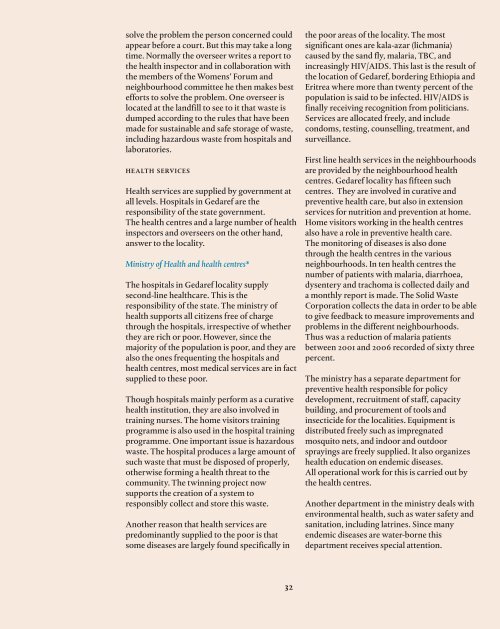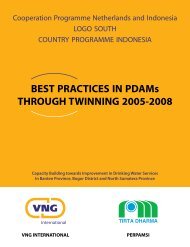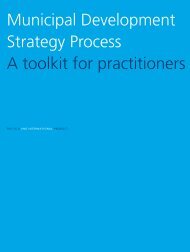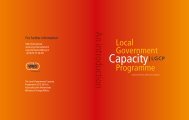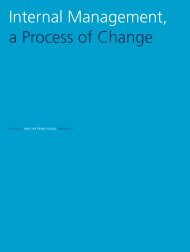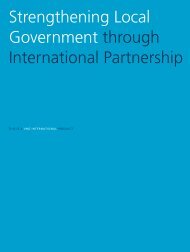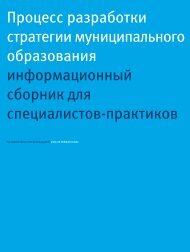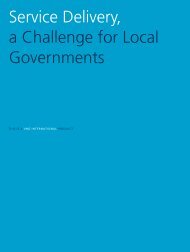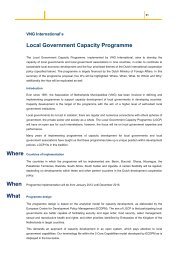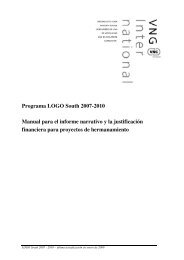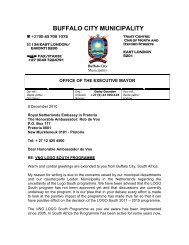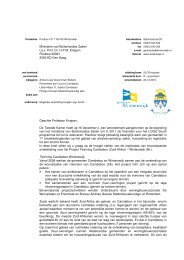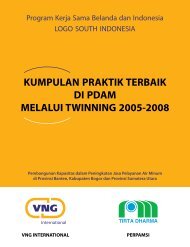Opmaak 1 - VNG International
Opmaak 1 - VNG International
Opmaak 1 - VNG International
You also want an ePaper? Increase the reach of your titles
YUMPU automatically turns print PDFs into web optimized ePapers that Google loves.
solve the problem the person concerned could<br />
appear before a court. But this may take a long<br />
time. Normally the overseer writes a report to<br />
the health inspector and in collaboration with<br />
the members of the Womens’ Forum and<br />
neighbourhood committee he then makes best<br />
efforts to solve the problem. One overseer is<br />
located at the landfill to see to it that waste is<br />
dumped according to the rules that have been<br />
made for sustainable and safe storage of waste,<br />
including hazardous waste from hospitals and<br />
laboratories.<br />
HEALTH SERVICES<br />
Health services are supplied by government at<br />
all levels. Hospitals in Gedaref are the<br />
responsibility of the state government.<br />
The health centres and a large number of health<br />
inspectors and overseers on the other hand,<br />
answer to the locality.<br />
Ministry of Health and health centres*<br />
The hospitals in Gedaref locality supply<br />
second-line healthcare. This is the<br />
responsibility of the state. The ministry of<br />
health supports all citizens free of charge<br />
through the hospitals, irrespective of whether<br />
they are rich or poor. However, since the<br />
majority of the population is poor, and they are<br />
also the ones frequenting the hospitals and<br />
health centres, most medical services are in fact<br />
supplied to these poor.<br />
Though hospitals mainly perform as a curative<br />
health institution, they are also involved in<br />
training nurses. The home visitors training<br />
programme is also used in the hospital training<br />
programme. One important issue is hazardous<br />
waste. The hospital produces a large amount of<br />
such waste that must be disposed of properly,<br />
otherwise forming a health threat to the<br />
community. The twinning project now<br />
supports the creation of a system to<br />
responsibly collect and store this waste.<br />
Another reason that health services are<br />
predominantly supplied to the poor is that<br />
some diseases are largely found specifically in<br />
the poor areas of the locality. The most<br />
significant ones are kala-azar (lichmania)<br />
caused by the sand fly, malaria, TBC, and<br />
increasingly HIV/AIDS. This last is the result of<br />
the location of Gedaref, bordering Ethiopia and<br />
Eritrea where more than twenty percent of the<br />
population is said to be infected. HIV/AIDS is<br />
finally receiving recognition from politicians.<br />
Services are allocated freely, and include<br />
condoms, testing, counselling, treatment, and<br />
surveillance.<br />
First line health services in the neighbourhoods<br />
are provided by the neighbourhood health<br />
centres. Gedaref locality has fifteen such<br />
centres. They are involved in curative and<br />
preventive health care, but also in extension<br />
services for nutrition and prevention at home.<br />
Home visitors working in the health centres<br />
also have a role in preventive health care.<br />
The monitoring of diseases is also done<br />
through the health centres in the various<br />
neighbourhoods. In ten health centres the<br />
number of patients with malaria, diarrhoea,<br />
dysentery and trachoma is collected daily and<br />
a monthly report is made. The Solid Waste<br />
Corporation collects the data in order to be able<br />
to give feedback to measure improvements and<br />
problems in the different neighbourhoods.<br />
Thus was a reduction of malaria patients<br />
between 2001 and 2006 recorded of sixty three<br />
percent.<br />
The ministry has a separate department for<br />
preventive health responsible for policy<br />
development, recruitment of staff, capacity<br />
building, and procurement of tools and<br />
insecticide for the localities. Equipment is<br />
distributed freely such as impregnated<br />
mosquito nets, and indoor and outdoor<br />
sprayings are freely supplied. It also organizes<br />
health education on endemic diseases.<br />
All operational work for this is carried out by<br />
the health centres.<br />
Another department in the ministry deals with<br />
environmental health, such as water safety and<br />
sanitation, including latrines. Since many<br />
endemic diseases are water-borne this<br />
department receives special attention.<br />
32


